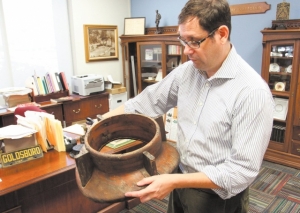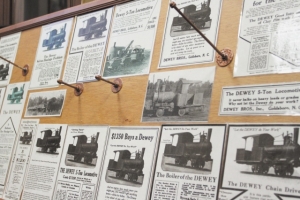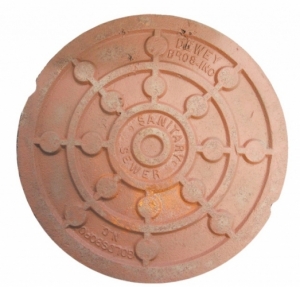A look at the Dewey Bros.
By Steve Herring
Published in News on October 23, 2017 5:50 AM

News-Argus/STEVE HERRING
Marty Tschetter, Wayne County Library local history librarian, holds a wooden pattern that was used at Dewey Bros. to fashion a mold for a part for a locomotive the company made in the early part of the 20th century. A free program on the history of the company will be held from 7 to 8 p.m. Tuesday at the Wayne County Public Library on East Ash Street.

News-Argus/STEVE HERRING
While Dewey Bros. was perhaps best known for making manhole covers and similar items, the company also made narrow-gauge locomotives during the early part of the 20th century.

Manhole covers like this one manufactured by Dewey Bros. can be found across the U.S. and the world.
The first 100 people to show up for a program about Wayne County's iconic Dewey Bros. could leave with a unique impression of the historic company known for its manhole covers.
The free program, to be held from 7 to 8 p.m. Tuesday, at the Wayne County Public Library, is part of the library's annual fall series on history and agriculture.
The first 100 attendees will receive a free T-shirt.
"It will be a retro (Dewey Bros.) design, kind of off-white," said Marty Tschetter, the library's local history librarian. "One thing that is real popular in Europe is people are looking at the artwork in manhole covers."
The library has an original manhole cover made by the company in the 1940s.
People who want to can have the shirt placed on the inked cover so that the pattern is imprinted on the back of the shirt or they can have it imprinted with the design from a water meter cover.
During the program the company will be remembered through recollections of former employees and presentations including exhibit panels about the Dewey family, company officers, company history and an explanation of the foundry process.
"We are going to start doing that at 6 to about 6:50," Tschetter said. "The program will last about an hour. There will be recollections. We have some really fantastic stories. It was a really hard-working place.
"I grew up in Greenville and in the old part near the university, and I distinctly remember these heavy industrial sewer grates that said Dewey Bros., Goldsboro. That always kind of intrigued me. I knew about Goldsboro, just down the road. You saw them all over the place. It is kind of fascinating and it comes up."
Tschetter said he has spoken with one man who remembers being in Frankfurt, Germany, in the early 1980s and being really homesick.
"He's walking down the street, and he looks down and sees a Dewey manhole cover from Goldsboro," Tschetter said. "You hear those kinds of stories. We found one (manhole cover), and he is going to come and tell that story."
Dewey Bros. traces its roots to a company started by W.F. Kornegay of Mount Olive. He had served in the Civil War and in 1874 started W.F. Kornegay Hardware and Agricultural Implements. Charles Dewey worked with him.
In 1884, in Goldsboro, Kornegay decided to sell out to Dewey. It became Dewey Brothers in 1885, and remained in operation until 1996.
It started out like other businesses and grows and figures out its niche, Tschetter said.
During the early 20th century it made more than 50 narrow-gauge locomotives for logging operations. The company also built cotton presses.
After World War II the company became largely associated with making manhole covers, water meter covers and heavy sewer grates.
"What is interesting is the Dewey family, who they are because there is really only one descendant left, a gentleman named Langhorne Bell, who has really helped me a lot," Tschetter said. "He lives in Goldsboro. His grandmother was a daughter of Charles Dewey.
"All of the others died out, or moved away. They are still an important family, but they just aren't around. The last Dewey to work there died in 1964."
One of the reasons for the company's demise is that it never really kept up with technology, he said.
"The stories are that in the 1970s, they were doing 1920s work," Tschetter said. "They really took a lot of pride in their work ethic."
Tschetter started working on the project in early August and has compiled list of employees from 1912 to 1974.
"The challenge is that the company is gone, just doesn't exist anymore," he said. "It wasn't sold, rather it just stopped being competitive and closed."
Tschetter also has been able to find about 40 of the patterns that were used to mold steel components crafted at the plant.
"They are beautiful, elegant hand-carved pieces of wood," he said. "All have dates and tells who it was made for.
"There would be a pattern shop. They would go in, make the pattern. Then they would put it in -- I guess -- this sand solution, and as it hardened, they would pull the pattern out. Then they would fill it with the molten stuff. It would harden and become a steel piece."
